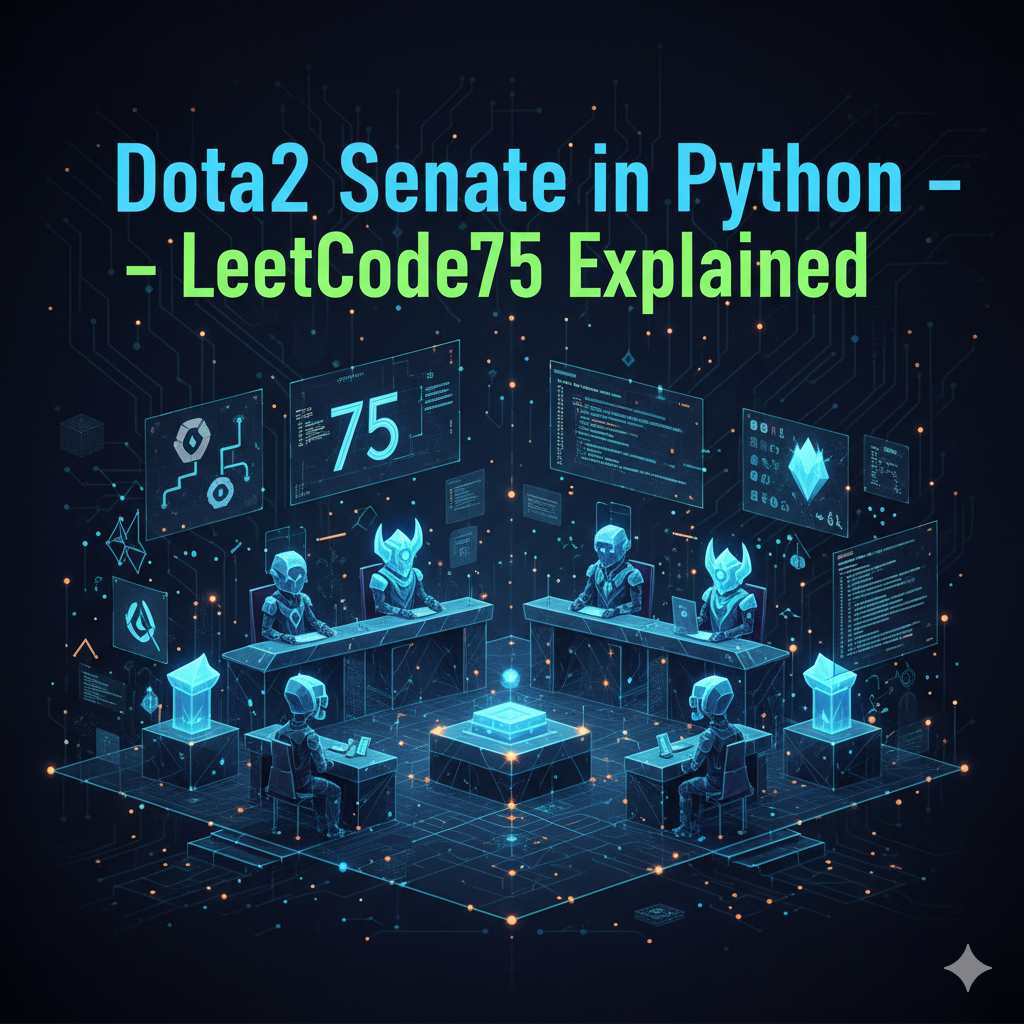The Dota2 Senate problem (LeetCode75) is an interesting simulation-based challenge that requires careful handling of queues and strategic thinking. It’s a popular problem because it combines string processing, greedy decisions and queue-based simulation into a single coding exercise.

In this blog, we’ll break down the problem statement, provide examples, walk through the complete Python solution and explain the step-by-step logic behind the implementation. By the end, you’ll have a clear understanding of how to solve this problem efficiently for coding interviews and competitive programming.
Problem Statement
The Dota2 Senate consists of senators from two parties: Radiant (R) and Dire (D). Each senator can ban one senator from the opposite party during each round.
The process continues in rounds:
- Senators act in the order they appear in the string.
- Once a senator bans another, the banned senator cannot act in the current or future rounds.
- The round repeats until all senators from one party are banned.
We must return the winning party: either "Radiant" or "Dire".
Understanding the Problem
The trick here is to realize that senators keep rotating through rounds. When a senator acts, they may ban someone from the opposite party but they themselves get pushed back to the next round.
To simulate this, we use two queues:
- One queue for Radiant senators (
R) - One queue for Dire senators (
D)
Each senator’s index determines who acts first. After acting, the winning senator gets re-added to the queue with an updated index for the next round.
Examples
Example 1
Input: senate = "RD"
Output: "Radiant"
Explanation: Radiant acts first and bans Dire immediately.
Example 2
Input: senate = "RDD"
Output: "Dire"
Explanation:
- Radiant bans one Dire.
- Remaining Dire senators act next and ban Radiant.
- Dire wins.
Complete Python Solution
from collections import deque
class Solution:
def predictPartyVictory(self, senate: str) -> str:
radiant_queue = deque()
dire_queue = deque()
n = len(senate)
for i, party in enumerate(senate):
if party == 'R':
radiant_queue.append(i)
else:
dire_queue.append(i)
while radiant_queue and dire_queue:
radiant_senator = radiant_queue.popleft()
dire_senator = dire_queue.popleft()
# The senator with the smaller index bans the other senator's right
if radiant_senator < dire_senator:
radiant_queue.append(radiant_senator + n)
else:
dire_queue.append(dire_senator + n)
return "Radiant" if radiant_queue else "Dire"
Step-by-Step Explanation
Step 1: Initialize Queues
We create two queues: one for Radiant senators and one for Dire senators. Each senator is stored with their index.
radiant_queue = deque()
dire_queue = deque()
Step 2: Fill Queues with Senators
Loop through the string and assign senators to their respective queues.
for i, party in enumerate(senate):
if party == 'R':
radiant_queue.append(i)
else:
dire_queue.append(i)
Step 3: Simulate the Banning Process
While both queues are non-empty, pick one Radiant and one Dire senator. The senator with the smaller index acts first and bans the other.
while radiant_queue and dire_queue:
radiant_senator = radiant_queue.popleft()
dire_senator = dire_queue.popleft()
Step 4: Reassign Winner to Next Round
The senator who survives gets re-added to the queue with index +n (to place them in the next round).
if radiant_senator < dire_senator:
radiant_queue.append(radiant_senator + n)
else:
dire_queue.append(dire_senator + n)
Step 5: Declare the Winner
The last remaining queue determines the winning party.
return "Radiant" if radiant_queue else "Dire"
Time and Space Complexity
- Time Complexity:
O(n)→ Each senator is added and removed from the queue once. - Space Complexity:
O(n)→ Two queues store senator indices.
Edge Cases
- Input:
"R"→ Output:"Radiant"(only one senator). - Input:
"D"→ Output:"Dire"(only one senator). - Input:
"RRDDD"→ Output:"Dire"(Dire has more senators, Radiant eventually banned).
Real-World Applications
This problem may seem like a game but the simulation approach models real scenarios such as:
- Parliament or voting simulations where members eliminate others based on order and strategy.
- Queue-based task scheduling in operating systems.
- Resource competition in networks where processes block each other.
Conclusion
The Dota2 Senate problem is more than just a game-based challenge – it’s a great exercise in combining queue-based simulation with greedy decision-making. By representing senators with indices and simulating their actions round by round, we can model complex interactions in a simple and efficient way.
Working through this problem not only deepens your knowledge of queues and greedy algorithms but also strengthens your ability to design simulations that mirror real-world scenarios such as voting systems, scheduling and resource competition. It’s an excellent preparation tool for coding interviews and a practical skill for solving dynamic problems in software engineering.
Related Reads
- Number of Recent Calls (LeetCode75) – Python Solution Explained
- Decode String in Python – Step-by-Step LeetCode75 Solution
- 500 + AI, Machine Learning, Deep Learning, Computer Vision and NLP Projects with Code
- SkyPilot: Simplifying AI Workload Management Across Any Infrastructure
- Motia: The Unified Backend Framework That Eliminates Runtime Fragmentation

4 thoughts on “Dota2 Senate in Python – LeetCode75 Explained”